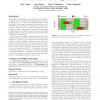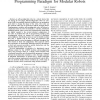152 search results - page 8 / 31 » Using Simple Diffusion to Synchronize the Clocks in a Distri... |
103
click to vote
ICS
2005
Tsinghua U.
15 years 8 months ago
2005
Tsinghua U.
As parallel jobs get bigger in size and finer in granularity, “system noise” is increasingly becoming a problem. In fact, fine-grained jobs on clusters with thousands of SMP...
111
click to vote
IPPS
2009
IEEE
15 years 9 months ago
2009
IEEE
Failure detectors are a service that provides (approximate) information about process crashes in a distributed system. The well-known “eventually perfect” failure detector, 3P...
109
Voted
MOBICOM
2012
ACM
13 years 5 months ago
2012
ACM
In this paper, we propose a novel clock calibration approach called FLIGHT, which leverages the fact that the fluorescent light intensity changes with a stable period that equals...
133
click to vote
ROBOCOMM
2007
IEEE
15 years 9 months ago
2007
IEEE
—A self-reconfigurable robot is a robotic device that can change its own shape. Self-reconfigurable robots are commonly built from multiple identical modules that can manipulat...
240
Voted
CC
2009
Springer
16 years 3 months ago
2009
Springer
Abstract. Clocks are a mechanism for providing synchronization barriers in concurrent programming languages. They are usually implemented using primitive communication mechanisms a...


